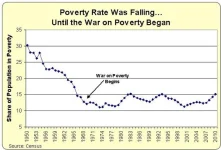Under the leadership of the Obama administration welfare has been directly expanded through these policies:
-Provision of funds to states for the purpose of the sole purpose of welfare expansion
For example, the 2009 Stimulus provided $5 billion under the "Welfare Emergency Fund" for handouts, with no focus on promoting work
-Encouraged welfare spending, specifically through the 2009 Stimulus, which weakened the program's requirements for work
-Expanded unemployment checks to a record 99 weeks (nearly 2 years) per person also through the 2009 Stimulus
-Rewarded states for expanding unemployment benefits, including people who quit their jobs
-Increased the size of unemployment checks under the 2009 Stimulus which adds $100 per month, or $1,200 a year
-Suspended work requirements for food stamps for able-bodied men (also every other budget proposed by Pres. Obama has called for a continuation of these suspensions)
-Expanded food stamp program adding $80 per family, or nearly $1,000 per year
-Allowing ANYONE regardless of savings or assets to receive food stamps and Medicaid
The passage of Obamacare has effectively removed asset limits for Medicaid recipients.
Administrative action has also removed asset limits for food stamps <http://www.fns.usda.gov/snap/rules/Memo/2009/093009.pdf>
The reasoning behind these policies could not be any more noble. It is firmly believed by the masses that each of these actions will effectively aid the poor and limit the supposedly "enormous" gap between the rich and the poor. However, this notion could not be any more of a fallacy, and sadly it is infeasible that the majority of politicians who advocate these policies are unaware of the negative effects caused by such policy.
The underlying problem behind any attempt to redistribute the wealth on a large scale is that incentives to work by the recipients are lost. If an easier form of income is attainable, that method of income will certainly be chosen. Further more if a productive member of society sees an opportunity to gain a reasonable income without work, he will also most likely chose that method. Before the late 1960's when the "war on poverty" begun, the US had been experiencing a steady decline in rates of poverty:
View attachment 67143700
Attempts to redistribute wealth stagnated the previously decreasing rate of poverty.
Not only is a lack of incentive created through these attempts, but the free market is damaged by tax increases needed for such levels of redistribution. Businesses become less fruitful, therefore cannot afford to employ as many people and must lower their wages (and if minimum wage laws are in place to inhibit the lowering of wages, then even more lay-offs occur). Focus on education is also lost and is instead placed on physical redistribution. This explains why the large percent of children who grew up in poverty, remain in poverty. So called "welfare" for the poor casts members of the lower classes and their posterity into a cycle of destitution and demoralization.
There is, however, a solution which would greatly benefit the poor. Enable the free market to properly operate, while ensuring that proper labor right laws are in place to inhibit deplorable working conditions seen in the Gilded Age. Never before has the world seen a freer period with as much mobility between classes as America in the 19th century. Unfortunately the progressive movement of the early 20th century put an end to this prosperity and mobility by implementing policy that restricted free enterprise. However, in the 1920's the market was again revived by Harding and Cooldige, creating one of the greatest short periods of prosperity the world had ever seen. Unfortunately, the 1929 crash (further exacerbated by the fed creating a depression) enabled progressives such as Hoover and FDR to further diminish American values by implementing policies like the ones in the New Deal which remove personal responsibility and working incentives, forever casting America into a downward spiral towards an economy dependent upon government intervention.

